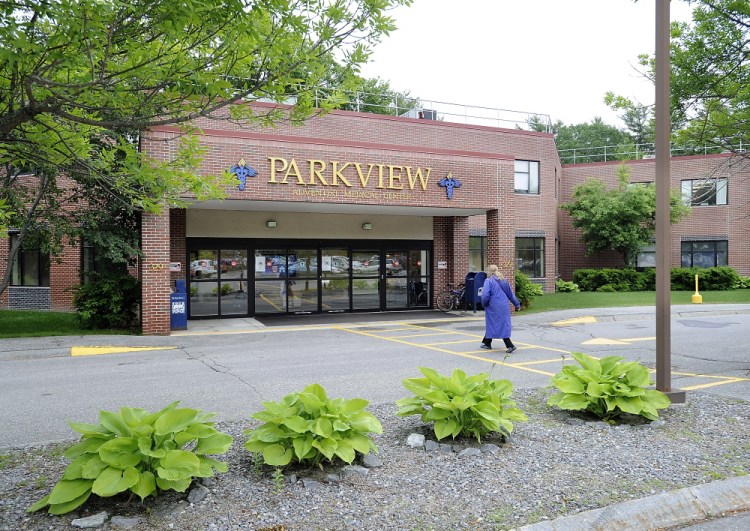Parkview Adventist Medical Center, the Brunswick hospital that filed for bankruptcy protection in June, will not close or cut off services despite the unexpected loss its federal Medicare reimbursements about six weeks ago, according to the hospital’s president.
The federal Centers for Medicare and Medicaid Services, which administers the federal health care subsidy programs, has refused to provide Medicare reimbursements to Parkview since mid-June, when the hospital closed its emergency department as part of a proposed bankruptcy sale to former rival Mid Coast Health Services.
In July, the loss of Medicare reimbursements cost Parkview $300,000, according to hospital President Randee Reynolds. The impact won’t be on the availability of health care services at the facility, but will affect how much money will be available to Parkview’s unsecured creditors once the bankruptcy sale is complete, said Reynolds.
The hospital’s top 20 unsecured creditors are owed more than $1 million, and the hospital listed total liabilities in its bankruptcy filing at between $10 million and $50 million.
Parkview’s dispute with CMS began with a June 15 letter from Reynolds, addressed to CMS’ regional manager in Boston, to notify the federal agency that the 55-bed hospital affiliated with the Seventh Day Adventist Church planned to file for bankruptcy and would terminate its participation in the Medicare program once a bankruptcy judge approved the hospital’s sale to Mid Coast. Parkview, Reynolds wrote, “is closing as a hospital effective upon the order of the Bankruptcy Court and will no longer participate in the Medicare Program … as an acute care hospital provider.” He estimated in the letter that the court order would come within 60 to 90 days.
Reynolds also informed CMS that as part of its bankruptcy plans and proposed sale to Mid Coast, Parkview would on June 18 close its emergency department and no longer accept inpatients, but that it would continue to provide a series of outpatient services, including a walk-in clinic, radiology services, laboratory services, physical and occupational therapy services, and oncology and hematology services until the sale to Mid Coast is complete.
A response four days later from a different official in the Boston office caught Reynolds by surprise. The letter said that because Reynolds did not provide a date for the voluntary termination of the Medicare agreement, CMS would consider the hospital’s Medicare agreement terminated as of June 18, the day Parkview closed its inpatient services. Parkview hasn’t received a reimbursement since that date, Reynolds said.
“We followed procedures to the letter of the law, as far as we know,” he said. “How it was perceived in Boston … we’re all a little confused at this point.”
By law, Reynolds was required to notify CMS that it would be terminating its Medicare agreement when the bankruptcy judge approved Parkview’s sale to Mid Coast. But he couldn’t be specific in the letter about a termination date because he didn’t know when the judge would approve the sale, he said.
George Marcus, Parkview’s attorney, said Reynolds letter was “pretty straightforward” and that the fault lies with CMS’ interpretation of the applicable laws.
Last month, Marcus asked the bankruptcy judge to intervene and require CMS to continue reimbursing the hospital for its outpatient services until the Mid Coast merger is complete.
In the court filing, Marcus called CMS’ actions “an exercise in semantics that is contrary to public well-being.” While Maine issued the hospital a conditional license while it works on the proposed bankruptcy sale, “CMS is more worried about the federal treasury than patient health,” Marcus wrote.
He also wrote that CMS’ refusal to reimburse Medicare payments for its outpatient services “would disrupt patient care and may force the Debtor to abruptly discontinue all medical services to the detriment of its patients, many of whom are engaged in a course of treatment that involves multiple treatment visits.”
REGULATORS REFUSE TO BUDGE
CMS stood its ground. In a filing dated July 20, federal attorneys not only asked the bankruptcy judge to dismiss Marcus’ attempts to force CMS to provide the reimbursements, it also clarified that even if it considered Parkview’s Medicare reimbursement agreement still intact, the closure of its inpatient services on June 18 meant it “no longer met the definition of “hospital” as required by the statute, and so therefore would not be eligible to receive Medicare reimbursements.
“Parkview cannot – and apparently would not be able to at any point in the future – satisfy all of the requirements of its Hospital Medicare Provider Agreement in order to receive payment(s) on Medicare claims even if such an agreement remained in place,” the court document reads.
The bankruptcy judge suggested the parties settle the case outside the bankruptcy proceeding, according to Marcus. Marcus said they are starting an administrative proceeding within CMS to appeal the agency’s decision.
But Marcus said he expects the merger with Mid Coast will be completed before the dispute with CMS is settled, avoiding any further talk of a shutdown of services.
A bankruptcy hearing is scheduled Aug. 19 for the judge to consider the asset purchase agreement between Parkview and Mid Coast. If all goes well, Marcus said he believes the sale will be complete by the end of August. That would make moot the Medicare dispute – the outpatient services would fall under Mid Coast’s umbrella and be covered under its existing Medicare provider agreement with CMS.
“If (the sale) went on long enough it would be a significant problem, but given the circumstances and timing of the sale things should be fine,” Marcus said.
Reynolds said he feels a “fiduciary responsibility” to battle CMS over reimbursements to secure as many dollars as he can to pay creditors.
“That’s why it’s important in the end,” he said, “but right now it’s important to provide services to the patients that need them.”
Send questions/comments to the editors.



Comments are no longer available on this story